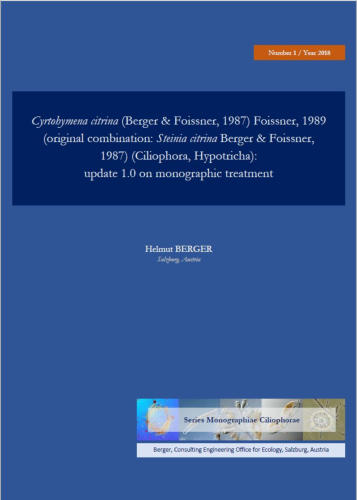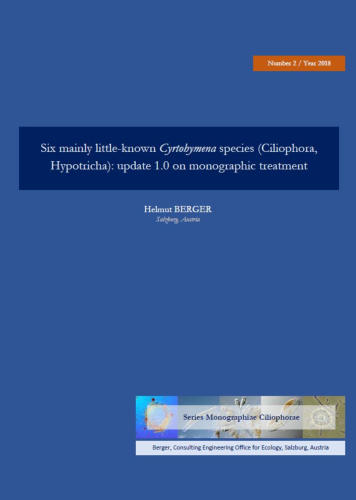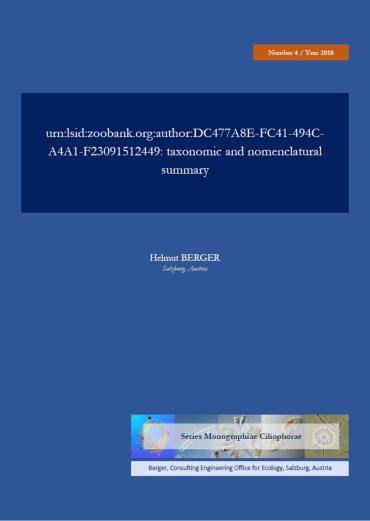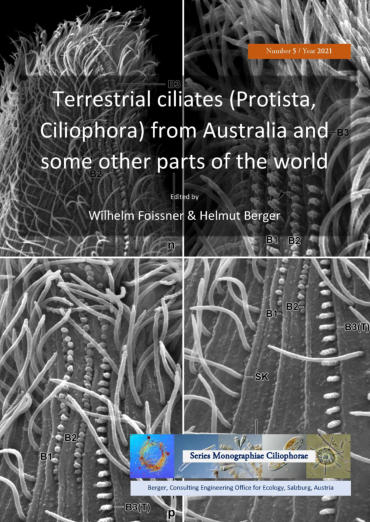NAVIGATION
ADDRESS
Technisches Büro für Ökologie
Consulting Engineering Office for Ecology
Radetzkystrasse 10
5020 Salzburg
Austria
CONTACT
office@protozoology.com
https://protozoology.com/tb or
https://www.protozoology.com
tel: 0662-27 64 08 (leave a message
on the answering machine)
fax: 0662-27 64 08-1
last update: 2025.03.19
Number 1
BERGER Helmut (2018). Cyrtohymena citrina (Berger & Foissner, 1987) Foissner, 1989
(original combination: Steinia citrina Berger & Foissner, 1987) (Ciliophora, Hypotricha):
update 1.0 on monographic treatment. – Series Monographiae Ciliophorae, Number 1, 1–16.
Print edition: ISBN 978-3-902147-03-5
Sale: Net price: 10 Euro (price inclusive 10% VAT = 11 Euro). For information on total price
(including handling, shipping, VAT), ordering, and payment click here
PDF Open Access (70 KB). Abstract. The present work is mainly a literature update to the monographic treatment by Berger (1999). Steinia citrina was discovered by Berger & Foissner (1987) in soil from Greece. In 1989 it was transferred to Cyrtohymena by Foissner. Later, it was classified in the nominotypical subgenus Cyrtohymena (Cyrtohymena) by Foissner (2004). However, the current systematic status is again Cyrtohymena citrina (Berger & Foissner, 1987) Foissner, 1989 be-cause division of Cyrtohymena into subgenera has been overruled. So far, populations from Germany, Greece, Turkey, India, and Korea have been described more or less detailed. All relevant contributions are listed in a detailed synonymy. Type slides of C. citrina are deposited in the Biology Centre of the Upper Austrian Museum in Linz (LI). A brief morphological characterisation, based on the available descriptions, is provided. For details on morphology and for illustrations and micrographs the reader is referred to the original papers and revisions. In molecular trees, Cyrtohymena citrina usually clusters with Paraurostyla weissei. It is included in about 110 phylogenetic studies; references are listed separately for each sequence. The sequences available so far do not form a monophyletic group. Faunistic records are available from Europe, Asia, North, Central, and South Americas, Africa, as well as Australia. Cyrtohymena citrina is moderately common and occurs in terrestrial and limnetic habitats. 145 references dealing with this species are listed. The ZooBank registration number of C. citrina is: urn:lsid:zoobank.org:act:50B6E92E-26AF-4346-82DA-71340A61A2BB. Key words: bibliography; guide; literature; monograph; nomenclature; review; revision; taxonomy http://zoobank.org/References/3B6AE9C4-32B6-4973-94D0-3C67CE59E48DNumber 2
BERGER Helmut (2018): Six mainly little-known Cyrtohymena species (Ciliophora,
Hypotricha): update 1.0 on monographic treatment. – Series Monographiae
Ciliophorae, Number 2, 1–24. Print edition: ISBN 978-3-902147-04-2
Sale: Net price: 10 Euro (price inclusive 10% VAT = 11 Euro). For information on total
price (including handling, shipping, VAT), ordering, and payment click here
Abstract. The present work is mainly an update on the monographic treatment by Berger (1999) who revised, inter alia, the genus Cyrtohymena Foissner, 1989, comprising 15 species. Since then, several species have been transferred to other genera and thus Cyrtohymena currently contains eight species. The present work deals with six mainly little-known species, namely C. gracilis, C. granulata, C. marina, C. primicirrata, C. sapropelica, and C. torrenticola. Cyrtohymena citrina was already updated while C. muscorum, type species of Cyrtohymena, will be treated in the next part of this series. For each species, all relevant contributions are listed in a detailed synonymy. A brief mor-phological characterization, based on available descriptions, is provided for each species. The nomenclatural and taxonomic history is discussed at length. All species have been registered in ZooBank. For details on mor-phology and for illustrations and micrographs the reader is referred to the original papers and revisions. For each species all records are listed in the occurrence and ecology section. About 70 papers deal with these species. A key to all Cyrtohymena species is included.. Key words: guide; literature; monograph; nomenclature; review; revision; taxonomy http://zoobank.org/References/E69E49D0-3161-49B3-BB8B-B98A7D4B2CEE

Number 3
BERGER Helmut (2018): Cyrtohymena Foissner, 1989 and Cyrtohymena muscorum (Kahl,
1932) Foissner, 1989 (original combination Oxytricha (Steinia) muscorum Kahl, 1932)
(Ciliophora, Hypotricha): update 1.0 on monographic treatment. – Series Monographiae
Ciliophorae, Number 3, 1–28. Print edition: ISBN 978-3-902147-05-9
Sale: Net price: 10 Euro (price inclusive 10% VAT = 11 Euro). For information on total
price (including handling, shipping, VAT), ordering, and payment click here
Abstract. The present work is an update to the monographic treatment by Berger (1999) of Cyrtohymena and its type species, C. muscorum. The oxytrichid genus Cyrtohymena was established by Foissner in 1989 for most species previously classified in Steinia. These two genera differ, inter alia, in the shape of the undulating membranes (Cyrtohymena pattern vs. Steinia pattern), the consistency of the cell (flexible vs. rigid), the cortical granulation (present in many species vs. absent because a stylonychid), and the behaviour of the postoral ventral cirrus V/3 during cell division (involved in primordia formation vs. not involved). The type species of Cyrtohymena, Oxytricha (Steinia) muscorum Kahl, 1932, was redescribed several times and is reliably recorded from Europe, Asia, North America, and Africa. All relevant contributions, including two subjective synonyms, are listed in a detailed synonymy. A detailed morphological characterization is provided. The morphological, ontogenetic, and gene sequence data indicate that Cyrtohymena muscorum is an oxytrichid, that is, a flexible dorsomarginalian hypotrich with kinety 3 fragmentation. Cyrtohymena muscorum is moderately common and occurs (exclusively?) in terrestrial habitats. In total, it is recorded at least 47 times, including some original records. The ZooBank registration number of Cyrtohymena is: urn:lsid:zoobank. org:act:CE7680BF-D4CB-4BF9-A25B-AE31AECD4 BAB. The ZooBank registration number of C. muscorum is: urn:lsid:zoobank. org:act:D579DE5A-F7AA-4D97- B3F0-6AB30D6CAECA. A key to the species assigned to Cyrtohymena is provided and the species misclassified in this genus are discussed. All ciliate names mentioned in the Cyrtohymena updates are indexed. Key words: bibliography; guide; key; literature; monograph; nomenclature; review; revision; taxonomy

You have to use this form to order a print edition (click here for download; PDF; contains also the text on Prices, Ordering and Payment,
Data Privacy, and Returnig items).
PDFs are OA ( go to https://www.protozoology.com/sci/publications.htm#papers. If protected, send e-mail to office@protozoology.com to
get the username and password for free download).



Number 4
Berger Helmut (2018): urn:lsid:zoobank.org.author:DC477A8E-FC41-494C-A4A1-
F23091512449: taxonomic and nomenclatural summary. - Series Monographiae
Ciliophorae, Number 4: 1-52. Print edition. ISBN 978-3-902147-06-6
PDF: Open Access (800 KB)
Sale: Net price of print edition: 10 Euro (price inclusive 10% VAT = 11 Euro). For
information on total price (including handling, shipping, VAT), ordering, and payment click here
Abstract: The present work is a summary of my taxonomic output since 1983 when I published my first scientific work. Since then, my co-authors (mainly W. Foissner) and I have published 126 works which contain: one (unnamed) variant; 19 new subspecies; 185 new species; eight new subgenera; 70 new genera; 12 new suprageneric taxa; nine new communities; and two nomina nuda. In addition, we made 284 combinations, about 1600 redescriptions and/or reviews of 1453 taxa, and 47 changes in rank; 17 names have been corrected. All these taxa and names are listed, including reference and page number so that they can be found easily in my publications. Five scientific projects, approved by the Austrian Science Fund (FWF) and the Austrian Academy of Sciences and made be-tween 2001 and 2017, are briefly presented. In total, 126 works (16 books; 58 papers; 52 abstracts) have been published. All taxonomically relevant works are registered in ZooBank. Key words: Ciliophora; Hypotricha; literature; nomenclature; review; revision; taxonomy
Number 5
Foissner W. & Berger H. (Eds) (2021): Terrestrial ciliates (Protista, Ciliophora) from
Australia and some other parts of the world. — Series Monographiae Ciliophorae 5:
i–xii, 1–380. A4. ISBN 978-3-902147-07-3
Online available since 2021.01.28
PDF: Open Access (181 MB)
Print edition: Sale! Net price 35.00 Euro. Send an email to
office@protozoology.com to get an offer including handling, postage, and VAT.
Abstract: The main chapter of the present work deals with ciliates found in soil samples from Australia and some other parts of the world, namely, Austria, Botswana, Brazil, Dominican Republic, Jamaica, Madeira Island (Portugal), Mexico, Namibia, Sweden, The Netherlands, and the USA. It is the main work of Wilhelm Foissner’s (1948–2020) last scientific project. In total, six subspecies, 32 new species, 11 new genera, one new combination, one new subfamily, and three new families are described and established, respectively. In addition, the status of two taxa is changed and 18 redescriptions, emendations, and remarks are provided. The type and voucher slides of the species and subspecies treated are figured in a separate chapter. Another part of the book deals with methods of sampling, collection of material for preparations, identification, description, species concept, and types. Microscopical methods for taxonomic studies of ciliates are updated. Key words: Australia; biogeography; Ciliophora; new taxa; review; soil biology; taxonomy


Number 6 NEW
Foissner W., Xu K. & Berger H. (Eds) (2025): Revision of some spathidiid genera
(Alveolata, Ciliophora, Spathidiida). — Series Monographiae Ciliophorae 6: i–xv, 1–465.
ISBN 978-3-902147-08-0
Online available since 2025.01.31
PDF: Open Access (155 MB) Note: On page 37 the upper part of the illustration was
not schown in the PDF uploaded on 31 Jan 2025. In the present PDF (19 Mar 2025),
the complete illustration is shown.
Print edition: Net price 60.00 Euro. Send an email to office@protozoology.com to
get an offer including handling, postage, and VAT.
Abstract: This book deals with some spathidiid taxa. The following genera are treated and established, respectively: Apospathidium Foissner et al., 2002; Centrospathidium nov. gen.; Epispathidium Foissner, 1984; Latispathidium Foissner et al., 2005; Schmidingerophrya nov. gen.; Semibryophyllum nov. gen.; Semispathidium Foissner et al., 2002; Supraspathidium Foissner & Didier, 1981; Pharyngospathidium nov. gen. (type genus of Pharyngospathidiidae nov. fam.); Neospathidium nov. gen.; Neocultellothrix Foissner nov. gen. The latter genus “replaces” Cultellothrix Foissner, 2003, an unavailable genus because no holotype was fixed for the type species in the original description. In addition, 12 Spathidium species are reviewed, and three new species assigned to this genus are described. In total, four new subspecies, 19 new species, six new genera, and one new family are described, 13 species are transferred to other genera, and 41 known species and two subspecies are reviewed. Further, three “Spathidium groups” are discussed. The type slides of the new species and voucher slides of the redescribed species are documented.

Number 1
BERGER Helmut (2018). Cyrtohymena citrina
(Berger & Foissner, 1987) Foissner, 1989 (original
combination: Steinia citrina Berger & Foissner,
1987) (Ciliophora, Hypotricha): update 1.0 on
monographic treatment. – Series Monographiae
Ciliophorae, Number 1, 1–16. Print edition: ISBN
978-3-902147-03-5
Sale: Net price: 10 Euro (price inclusive 10% VAT
= 11 Euro). For information on total price (including
handling, shipping, VAT), ordering, and payment click here
PDF Open Access (70 KB). Abstract. The present work is mainly a literature update to the monographic treatment by Berger (1999). Steinia citrina was discovered by Berger & Foissner (1987) in soil from Greece. In 1989 it was transferred to Cyrtohymena by Foissner. Later, it was classified in the nominotypical subgenus Cyrtohymena (Cyrtohymena) by Foissner (2004). However, the current systematic status is again Cyrtohymena citrina (Berger & Foissner, 1987) Foissner, 1989 be-cause division of Cyrtohymena into subgenera has been overruled. So far, populations from Germany, Greece, Turkey, India, and Korea have been described more or less detailed. All relevant contributions are listed in a detailed synonymy. Type slides of C. citrina are deposited in the Biology Centre of the Upper Austrian Museum in Linz (LI). A brief morphological characterisation, based on the available descriptions, is provided. For details on morphology and for illustrations and micrographs the reader is referred to the original papers and revisions. In molecular trees, Cyrtohymena citrina usually clusters with Paraurostyla weissei. It is included in about 110 phylogenetic studies; references are listed separately for each sequence. The sequences available so far do not form a monophyletic group. Faunistic records are available from Europe, Asia, North, Central, and South Americas, Africa, as well as Australia. Cyrtohymena citrina is moderately common and occurs in terrestrial and limnetic habitats. 145 references dealing with this species are listed. The ZooBank registration number of C. citrina is: urn:lsid:zoobank.org:act:50B6E92E-26AF-4346-82DA- 71340A61A2BB. Key words: bibliography; guide; literature; monograph; nomenclature; review; revision; taxonomy http://zoobank.org/References/3B6AE9C4-32B6-4973- 94D0-3C67CE59E48DNumber 2
BERGER Helmut (2018): Six mainly little-known
Cyrtohymena species (Ciliophora, Hypotricha):
update 1.0 on monographic treatment. – Series
Monographiae Ciliophorae, Number 2, 1–24. Print
edition: ISBN 978-3-902147-04-2
Sale: Net price: 10 Euro (price inclusive 10% VAT
= 11 Euro). For information on total price (including
handling, shipping, VAT), ordering, and payment click
here
Abstract. The present work is mainly an update on the monographic treatment by Berger (1999) who revised, inter alia, the genus Cyrtohymena Foissner, 1989, comprising 15 species. Since then, several species have been transferred to other genera and thus Cyrtohymena currently contains eight species. The present work deals with six mainly little-known species, namely C. gracilis, C. granulata, C. marina, C. primicirrata, C. sapropelica, and C. torrenticola. Cyrtohymena citrina was already updated while C. muscorum, type species of Cyrtohymena, will be treated in the next part of this series. For each species, all relevant contributions are listed in a detailed synonymy. A brief mor-phological characterization, based on available descriptions, is provided for each species. The nomenclatural and taxonomic history is discussed at length. All species have been registered in ZooBank. For details on mor-phology and for illustrations and micrographs the reader is referred to the original papers and revisions. For each species all records are listed in the occurrence and ecology section. About 70 papers deal with these species. A key to all Cyrtohymena species is included.. Key words: guide; literature; monograph; nomenclature; review; revision; taxonomy http://zoobank.org/References/E69E49D0-3161-49B3- BB8B-B98A7D4B2CEE


Number 3
BERGER Helmut (2018): Cyrtohymena Foissner,
1989 and Cyrtohymena muscorum (Kahl, 1932)
Foissner, 1989 (original combination Oxytricha
(Steinia) muscorum Kahl, 1932) (Ciliophora,
Hypotricha): update 1.0 on monographic
treatment. – Series Monographiae Ciliophorae,
Number 3, 1–28. Print edition: ISBN 978-3-
902147-05-9
Sale: Net price: 10 Euro (price inclusive 10%
VAT = 11 Euro). For information on total price
(including handling, shipping, VAT), ordering, and
payment click here
Abstract. The present work is an update to the monographic treatment by Berger (1999) of Cyrtohymena and its type species, C. muscorum. The oxytrichid genus Cyrtohymena was established by Foissner in 1989 for most species previously classified in Steinia. These two genera differ, inter alia, in the shape of the undulating membranes (Cyrtohymena pattern vs. Steinia pattern), the consistency of the cell (flexible vs. rigid), the cortical granulation (present in many species vs. absent because a stylonychid), and the behaviour of the postoral ventral cirrus V/3 during cell division (involved in primordia formation vs. not involved). The type species of Cyrtohymena, Oxytricha (Steinia) muscorum Kahl, 1932, was redescribed several times and is reliably recorded from Europe, Asia, North America, and Africa. All relevant contributions, including two subjective synonyms, are listed in a detailed synonymy. A detailed morphological characterization is provided. The morphological, ontogenetic, and gene sequence data indicate that Cyrtohymena muscorum is an oxytrichid, that is, a flexible dorsomarginalian hypotrich with kinety 3 fragmentation. Cyrtohymena muscorum is moderately common and occurs (exclusively?) in terrestrial habitats. In total, it is recorded at least 47 times, including some original records. The ZooBank registration number of Cyrtohymena is: urn:lsid:zoobank. org:act:CE7680BF- D4CB-4BF9-A25B-AE31AECD4 BAB. The ZooBank registration number of C. muscorum is: urn:lsid:zoobank. org:act:D579DE5A-F7AA-4D97-B3F0-6AB30D6CAECA. A key to the species assigned to Cyrtohymena is provided and the species misclassified in this genus are discussed. All ciliate names mentioned in the Cyrtohymena updates are indexed. Key words: bibliography; guide; key; literature; monograph; nomenclature; review; revision; taxonomy


Number 4
Berger Helmut (2018):
urn:lsid:zoobank.org.author:DC477A8E-FC41-
494C-A4A1-F23091512449: taxonomic and
nomenclatural summary. - Series Monographiae
Ciliophorae, Number 4: 1-52. Print edition. ISBN
978-3-902147-06-6
PDF: Open Access (800 KB)
Sale: Net price of print edition: 10 Euro (price
inclusive 10% VAT = 11 Euro). For information on
total price (including handling, shipping, VAT), ordering,
and payment click here
Abstract: The present work is a summary of my taxonomic output since 1983 when I published my first scientific work. Since then, my co-authors (mainly W. Foissner) and I have published 126 works which contain: one (unnamed) variant; 19 new subspecies; 185 new species; eight new subgenera; 70 new genera; 12 new suprageneric taxa; nine new communities; and two nomina nuda. In addition, we made 284 combinations, about 1600 redescriptions and/or reviews of 1453 taxa, and 47 changes in rank; 17 names have been corrected. All these taxa and names are listed, including reference and page number so that they can be found easily in my publications. Five scientific projects, approved by the Austrian Science Fund (FWF) and the Austrian Academy of Sciences and made be-tween 2001 and 2017, are briefly presented. In total, 126 works (16 books; 58 papers; 52 abstracts) have been published. All taxonomically relevant works are registered in ZooBank. Key words: Ciliophora; Hypotricha; literature; nomenclature; review; revision; taxonomy


Number 5
Foissner W. & Berger H. (Eds) (2021): Terrestrial
ciliates (Protista, Ciliophora) from Australia and
some other parts of the world. — Series
Monographiae Ciliophorae 5: i–xii, 1–380. A4. ISBN
978-3-902147-07-3
Online available since 2021.01.28
PDF: Open Access (181 MB)
Print edition: Sale! Net price 35.00 Euro. Send an
email to office@protozoology.com to get an offer
including handling, postage, and VAT.
Abstract: The main chapter of the present work deals with ciliates found in soil samples from Australia and some other parts of the world, namely, Austria, Botswana, Brazil, Dominican Republic, Jamaica, Madeira Island (Portugal), Mexico, Namibia, Sweden, The Netherlands, and the USA. It is the main work of Wilhelm Foissner’s (1948–2020) last scientific project. In total, six subspecies, 32 new species, 11 new genera, one new combination, one new subfamily, and three new families are described and established, respectively. In addition, the status of two taxa is changed and 18 redescriptions, emendations, and remarks are provided. The type and voucher slides of the species and subspecies treated are figured in a separate chapter. Another part of the book deals with methods of sampling, collection of material for preparations, identification, description, species concept, and types. Microscopical methods for taxonomic studies of ciliates are updated. Key words: Australia; biogeography; Ciliophora; new taxa; review; soil biology; taxonomy
You have to use this form to order a print
edition (click here for download; PDF; contains
also the text on Prices, Ordering and Payment,
Data Privacy, and Returnig items).
PDFs are OA ( go to
https://www.protozoology.com/sci/publications.h
tm#papers. If protected, send e-mail to
office@protozoology.com to get the username
and password for free download).

Number 6 NEW
Foissner W., Xu K. & Berger H. (Eds) (2025):
Revision of some spathidiid genera (Alveolata,
Ciliophora, Spathidiida). — Series Monographiae
Ciliophorae 6: i–xv, 1–465. ISBN 978-3-902147-08-0
Online available since 2025.01.31
PDF: Open Access (155 MB) Note: On page 37
the upper part of the illustration was not schown
in the PDF uploaded on 31 Jan 2025. In the present
PDF (19 Mar 2025), the complete illustration is
shown.
Print edition: Net price 60.00 Euro. Send an
email to office@protozoology.com to get an offer
including handling, postage, and VAT.
Abstract: This book deals with some spathidiid taxa. The following genera are treated and established, respectively: Apospathidium Foissner et al., 2002; Centrospathidium nov. gen.; Epispathidium Foissner, 1984; Latispathidium Foissner et al., 2005; Schmidingerophrya nov. gen.; Semibryophyllum nov. gen.; Semispathidium Foissner et al., 2002; Supraspathidium Foissner & Didier, 1981; Pharyngospathidium nov. gen. (type genus of Pharyngospathidiidae nov. fam.); Neospathidium nov. gen.; Neocultellothrix Foissner nov. gen. The latter genus “replaces” Cultellothrix Foissner, 2003, an unavailable genus because no holotype was fixed for the type species in the original description. In addition, 12 Spathidium species are reviewed, and three new species assigned to this genus are described. In total, four new subspecies, 19 new species, six new genera, and one new family are described, 13 species are transferred to other genera, and 41 known species and two subspecies are reviewed. Further, three “Spathidium groups” are discussed. The type slides of the new species and voucher slides of the redescribed species are documented.

















